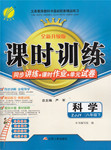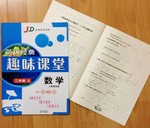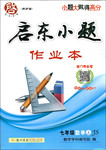题目内容
I ______ with Hanmeimei on the phone ______ the light went out.
- A.am talking; while
- B.was talking; when
- C.talked; when
- D.was talking; while
试题分析:考查时态和连词:句意:我正在和韩梅梅谈话,这时灯熄灭了。从后面的went out可知是用过去范畴的时态,排除A,还有while表示“一段时间”,排除D,从句意看是“正在谈话,这时…”可知第一空是过去进行时,第二空是when“这时” ,选B。
考点:考查时态和连词

 课时训练江苏人民出版社系列答案
课时训练江苏人民出版社系列答案 黄冈经典趣味课堂系列答案
黄冈经典趣味课堂系列答案 启东小题作业本系列答案
启东小题作业本系列答案
BELJLNG-Eating at a Beijing restaurant is usually an adventure for foreigners, and particularly when they get the chance to order “chicken without sex life” or “red burned lion head”.
Sometimes excited but mostly confused, embarrassed or even terrified, many foreigners have long complained about mistranslations of Chinese dishes. And their complaints are often valid, but such an experience at Beijing’s restaurants will apparently soon be history.
Foreign visitors will no longer, hopefully, be confused by oddly worded restaurant menus in the capital if the government’s plan to correctly translate 3,000 Chinese dishes is a success and the translations are generally adopted.
The municipal(市政)office of foreign affairs has published a book to recommend English translations of Chinese dishes, which aims to help restaurants avoid bizarre translations. It provides the names of main dishes of famous Chinese cuisines in plain English, “an official with the city’s Foreign Affairs office said .” Restaurants are encouraged to use the proposed translations, but it will not be compulsory .“ It’s the city’s latest effort to bridge the culture gap for foreign travelers in China.
Coming up with precise translations is a daunting task, as some Chinese culinary techniques are untranslatable and many Chinese dishes have no English-language equivalent.The translators, after conducting a study of Chinese restaurants in English-speaking countries, divided the dish names into four categories: ingredients, cooking method, taste and name of a person or a place. For some traditional dishes, pinyin, the Chinese phonetic system, is used, such as mapo tofu(previously often literally translated as “beancurd made by woman with freckles”), baozi(steamed stuffed bun ) and jiaozi (dumplings) to “reflect the Chinese cuisine culture,” according to the book.
“The book is a blessing to tourist guides like me. Having it, I don’t have to rack my brains trying to explain Chinese dishes to foreign travellers,” said Zheng Xiaodong, a 31- year – old employe with a Beijing- based travel agency.
“I will buy the book as I major in English literature and I’d like to introduce Chinese cuisine culture to more foreign friends,” said Han Yang, a postgraduate student at the University of International Business and Economics.
It is not clear if the book will be introduced to other parts of China. But on Tuesday, this was the most discussed topic on weibo. com, China’s most popular microblogging site.
【小题1】 What’s the best title of the passage?
| A.An adventure for foreigners who eat in Beijing. |
| B.Confusing mistranslations of Chinese dishes |
| C.Chinese dishes to have “official” English names |
| D.The effort to bridge the culture gap |
| A.some Chinese dishes are not well received |
| B.some Chinese dishes are hard to translate |
| C.some Chinese dishes are mistranslated |
| D.some Chinese dishes are not acceptable |
| A.Recommending a book on Chinese dishes |
| B.Advocating using precise translation for Chinese dishes |
| C.Publishing a book on China’s dietary habits |
| D.Providing the names of main Chinese dishes |
| A.confusing | B.disappointing | C.discouraging | D.worthwhile |
| A.not clear | B.excited | C.favorable | D.divided |
BELJLNG-Eating at a Beijing restaurant is usually an adventure for foreigners, and particularly when they get the chance to order “chicken without sex life” or “red burned lion head”.
Sometimes excited but mostly confused, embarrassed or even terrified, many foreigners have long complained about mistranslations of Chinese dishes. And their complaints are often valid, but such an experience at Beijing’s restaurants will apparently soon be history.
Foreign visitors will no longer, hopefully, be confused by oddly worded restaurant menus in the capital if the government’s plan to correctly translate 3,000 Chinese dishes is a success and the translations are generally adopted.
The municipal(市政)office of foreign affairs has published a book to recommend English translations of Chinese dishes, which aims to help restaurants avoid bizarre translations. It provides the names of main dishes of famous Chinese cuisines in plain English, “an official with the city’s Foreign Affairs office said .” Restaurants are encouraged to use the proposed translations, but it will not be compulsory .“ It’s the city’s latest effort to bridge the culture gap for foreign travelers in China.
Coming up with precise translations is a daunting task, as some Chinese culinary techniques are untranslatable and many Chinese dishes have no English-language equivalent.The translators, after conducting a study of Chinese restaurants in English-speaking countries, divided the dish names into four categories: ingredients, cooking method, taste and name of a person or a place. For some traditional dishes, pinyin, the Chinese phonetic system, is used, such as mapo tofu(previously often literally translated as “beancurd made by woman with freckles”), baozi(steamed stuffed bun ) and jiaozi (dumplings) to “reflect the Chinese cuisine culture,” according to the book.
“The book is a blessing to tourist guides like me. Having it, I don’t have to rack my brains trying to explain Chinese dishes to foreign travellers,” said Zheng Xiaodong, a 31- year – old employe with a Beijing- based travel agency.
“I will buy the book as I major in English literature and I’d like to introduce Chinese cuisine culture to more foreign friends,” said Han Yang, a postgraduate student at the University of International Business and Economics.
It is not clear if the book will be introduced to other parts of China. But on Tuesday, this was the most discussed topic on weibo. com, China’s most popular microblogging site.
1. What’s the best title of the passage?
|
A.An adventure for foreigners who eat in Beijing. |
|
B.Confusing mistranslations of Chinese dishes |
|
C.Chinese dishes to have “official” English names |
|
D.The effort to bridge the culture gap |
2. “chicken without sex life” or “red burned lion head” are mentioned in the beginning of the passage to show .
|
A.some Chinese dishes are not well received |
|
B.some Chinese dishes are hard to translate |
|
C.some Chinese dishes are mistranslated |
|
D.some Chinese dishes are not acceptable |
3. What measure has the municipal office taken?
|
A.Recommending a book on Chinese dishes |
|
B.Advocating using precise translation for Chinese dishes |
|
C.Publishing a book on China’s dietary habits |
|
D.Providing the names of main Chinese dishes |
4. What’s the meaning of daunting in paragraph 5?
|
A.confusing |
B.disappointing |
C.discouraging |
D.worthwhile |
5. What’s the attitude of most people to the book according to the passage?
|
A.not clear |
B.excited |
C.favorable |
D.divided |
第二节 根据对话内容,从对话后的选项中选出能填入空白处的最佳选项,并将答案填写在本题下面的横线上。选项中有两项多余选项。(共5小题;每小题2分,满分10分)
Purser: Excuse me, have you filled out your customs declaration form yet?
Han: No, I haven’t. ___1____
Purser: Yes._____2______
Han: Thanks...It looks rather complicated.
Purser:___3____ ---the Prohibited Articles List and the Duty-Free Quota List. Right.Here.
Han: I have nothing but personal belongings.
Purser:_____4__. But please go over the lists to make sure that you have nothing to declare.
Han: All right. We seem to be standing still.
Purser: ____5____. We’ve waiting for the quarantine (防疫)and immigration(移民) officers to come on board to check the passport and health certificates. There they are now, on that launch.
Han: Well, I’d better hurry and get ready to go ashore. Thank you.
|
A.In that case, just put down “personal effects”. |
|
B.I can help you. Please look through the two lists. |
|
C.Am I to fill it out before we land? |
|
D.I’d better hurry now. |
E.Here’s a form for you, sir.
F.The ship is docking(靠码头) soon.
G.What can I do with all my belongings?
My first most vivid and broad impression of the identity of things seems to me to have been gained on a memorable raw afternoon towards evening near my parents’ tomb in the churchyard.
“Hold your noise!” came a terrible voice, as a man started up from among the tombs at the side of the church. “Keep still, you little devil(小鬼), or I’ll cut your throat!”
A fearful man, all in coarse grey, with a great iron on his leg. A man with no hat, and with broken shoes, and with an old rag tied round his head. He seized me by the chin(下巴).
“Tell us your name!” said the man. “Quick!”
“Pip, sir.”
“Show us where you live,” said the man. “Point out the place!”
I pointed to where our village lay, on the flat in-shore among the alder-trees and pollards, a mile or more from the church.
The man, after looking at me for a moment, turned me upside down, and emptied my pockets. There was nothing in them but a piece of bread.
“You young dog,” said the man, licking his lips, “what fat cheeks you ha’ got. Darn me if I couldn’t eat em, and if I han’t half a mind to’t!”
I earnestly expressed my hope that he wouldn’t, and held tighter to the tombstone on which he had put me; partly, to keep myself upon it; partly, to keep myself from crying.
“Now then lookee here!” said the man. “Where’s your mother?”
“There, sir!” said I.
He started, made a short run, and stopped and looked over his shoulder.
“There, sir!” I timidly explained, pointed to the tombstone. “That’s my mother.”
“Oh!” said he, coming back. “And is that your father alonger your mother?”
“Yes, sir,” said I; “him too; late of this parish(教区).”
1. The “voice” in the second paragraph came from______.
A. the church B. the man C. the bank D. the boy
2.The boy probably lived _____.
A. in the parish B. in the valley C. in the city D. in the country
3.We can infer from the passage _____.
A. the boy was very calm and smart
B. the man hit the boy in the face
C. the boy would forever remember the raw afternoon
D. the man was very kind and considerate
4.The passage is most probably adapted from________.
A. a news report B. a science fiction C. a novel D. a review